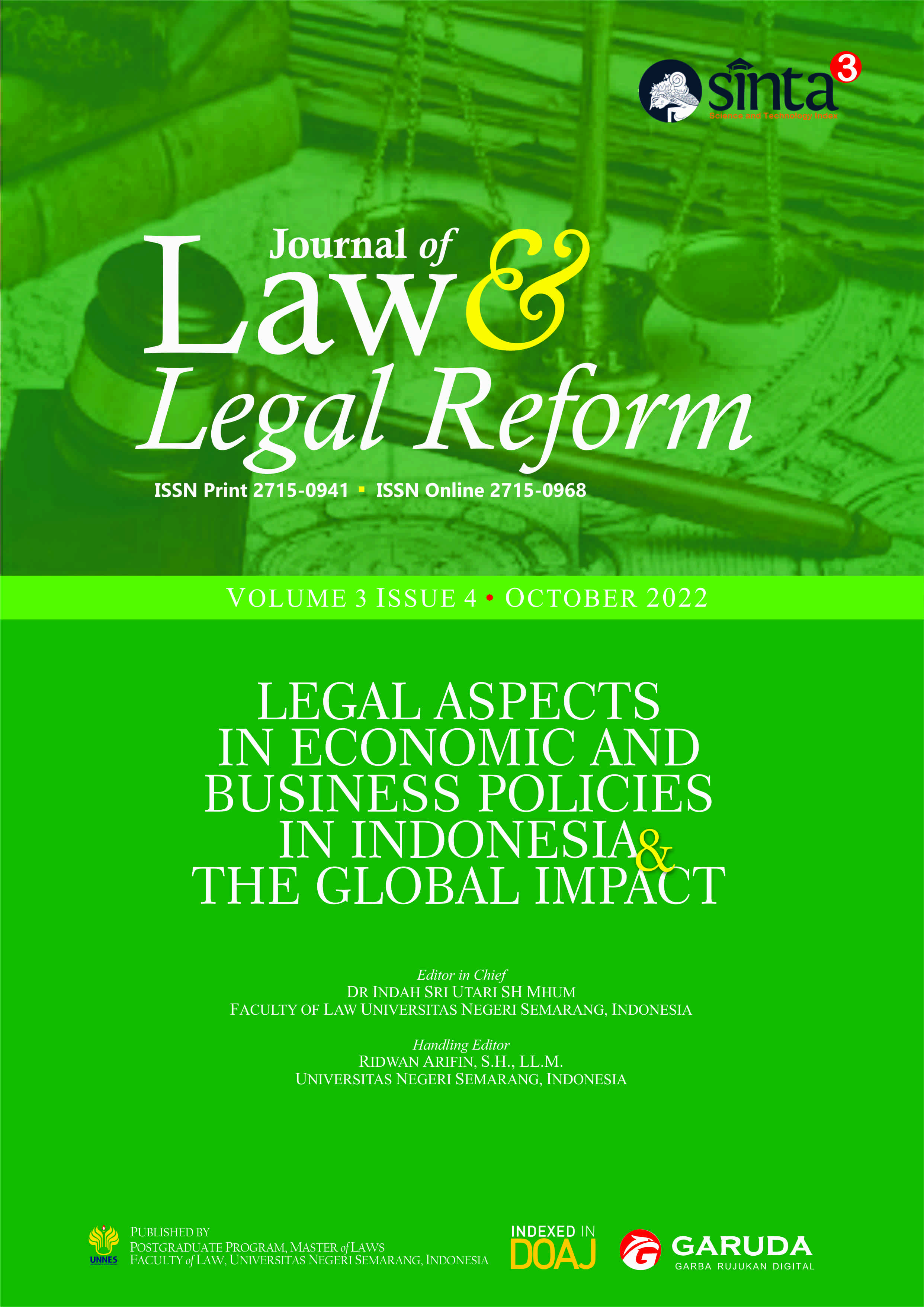The Problem of the Constitutional Court's Decision in the Formal Test of the Job Creation Law
Main Article Content
Abstract
One year already after the enactment of Law Number 11 of 2020 concerning Job Creation which was declared conditionally unconstitutional by the Constituency Court through Decision Number 91 / PUU-XVIII / 2020. The decision stated that the Job Creation Law contains formal defects in the process of its formation, so that the DPR and the Government must make improvements in accordance with the procedures for the formation of applicable laws and regulations, with a maximum period of 2 years since the decision was read by the Constitutional Court. The Job Creation Law caused debate in the community, because the Job Creation Law passed by the House of Representatives brought huge losses to the community, especially in the field of labor and investment. Therefore, the polemic of the ratification of the Job Creation Law must be corrected by the DPR and the Government in accordance with applicable regulations by bringing the principle of legal certainty and the principle of openness and also justice for all communities. From this writing, the author focuses on discussing the Formal Testing of the Job Creation Law After the Constitutional Court Decision and the direction of improvements made by the government after the Constitutional Court's Decision on the Job Creation Law. In writing this article, the author also uses normative juridical research methods sourced from books and also articles that are in accordance with the theme written.
Article Details

This work is licensed under a Creative Commons Attribution-NonCommercial-ShareAlike 4.0 International License.
All writings published in this journal are personal views of the authors and do not represent the views of this journal and the author's affiliated institutions. Author(s) retain copyrights under a Creative Commons Attribution-NonCommercial-ShareAlike 4.0 International (CC BY-NC-SA 4.0).
References
Anggono, Bayu Dwi. 2020. Pokok-Pokok Pemikiran Penataan Peraturan Perundang-undangan di Indonesia. Jakarta: Konpress.
Asshiddiqie, Jimly. 2020. Pengujian Formil Undang-Undang di Negara Hukum. Jakarta: Konpress.
Asshidiqie, Jimly. 2006. Perihal Undang-Undang. Jakarta: Konstitusi Press.
Dodek, Adam M., “Omnibus Bills: Constitutional Constraints and Legislative Liberations”, Ottawa Law Review, Vol. 48, No. 1, 2017.
Hamidi, Jazim, dan Kemilau Mutik. 2011. Legislatif Drafting. Yogyakarta: Total Media.
Indrati, Maria Farida. “Omnibus Law, UU Sapu Jagat?”. dalam Harian Kompas, 4 Januari 2020.
Indrati, Maria Farida. 2007. Ilmu Perundang-undangan: Proses dan Teknik Penyusunan. Yogyakarta: Kanisius.
Indrayana, Denny, “Lima Ambiguitas Putusan MK Terkait Pembatalan UU Cipta Kerja”, 26 November 2021, https://www.integritylawfirm.id/ 2021/11/26/lima-ambiguitas-putusan-mk-terkait-pembatalan-uu-ciptakerja/, diakses pada 22 Desember 2021
Indrayana, Denny. “Polemik Dibalik Putusan MK Terkait UU Cipta Kerja”. Makalah. Disampaikan dalam Diskusi Publik Perhimpunan Mahasiswa Katolik Republik Indonesia, Melbourne, Australia. Tanggal 6 Desember 2021.
Marzuki, Peter Mahmud. Penelitian Hukum. Edisi Revisi. Cetakan ke-14. Jakarta: Prenada Media Group, 2019.
Putusan Mahkamah Konstitusi Nomor 27/PUU-VII/2009.
Putusan Mahkamah Konstitusi Nomor 79/PUU-XVII/2019.
Putusan Mahkamah Konstitusi Nomor 91/PUU-XVIII/2020.
Topane Gayus Lumbuun, “Tindak Lanjut Putusan Mahkamah Konstitusi Oleh DPR RI”, Jurnal Legislasi Nasional, Vol 6 No 3, September 2009
Undang-Undang Nomor 11 Tahun 2020 tentang Cipta Kerja
Undang-Undang Nomor 12 Tahun 2011 tentang Pembentukan Peraturan Perundang-undangan.
Undang-Undang Nomor 8 Tahun 2011 tentang Perubahan atas Undang-Undang Nomor 24 Tahun 2003 tentang Mahkamah Konstitusi. Indonesia. Undang-Undang Nomor 24 Tahun 2003 tentang Mahkamah Konstitusi.
Yunan Hilmy, 2021, Kajian Awal Mengenai Implikasi Putusan MK No. 91/PUU-XVIII/2020 Terhadap Upaya Reformasi Regulasi, BPHN: Pusat Analisis Dan Evaluasi Hukum Nasional Badan Pembinaan Hukum Nasional Kementerian Hukum Dan Ham RI
